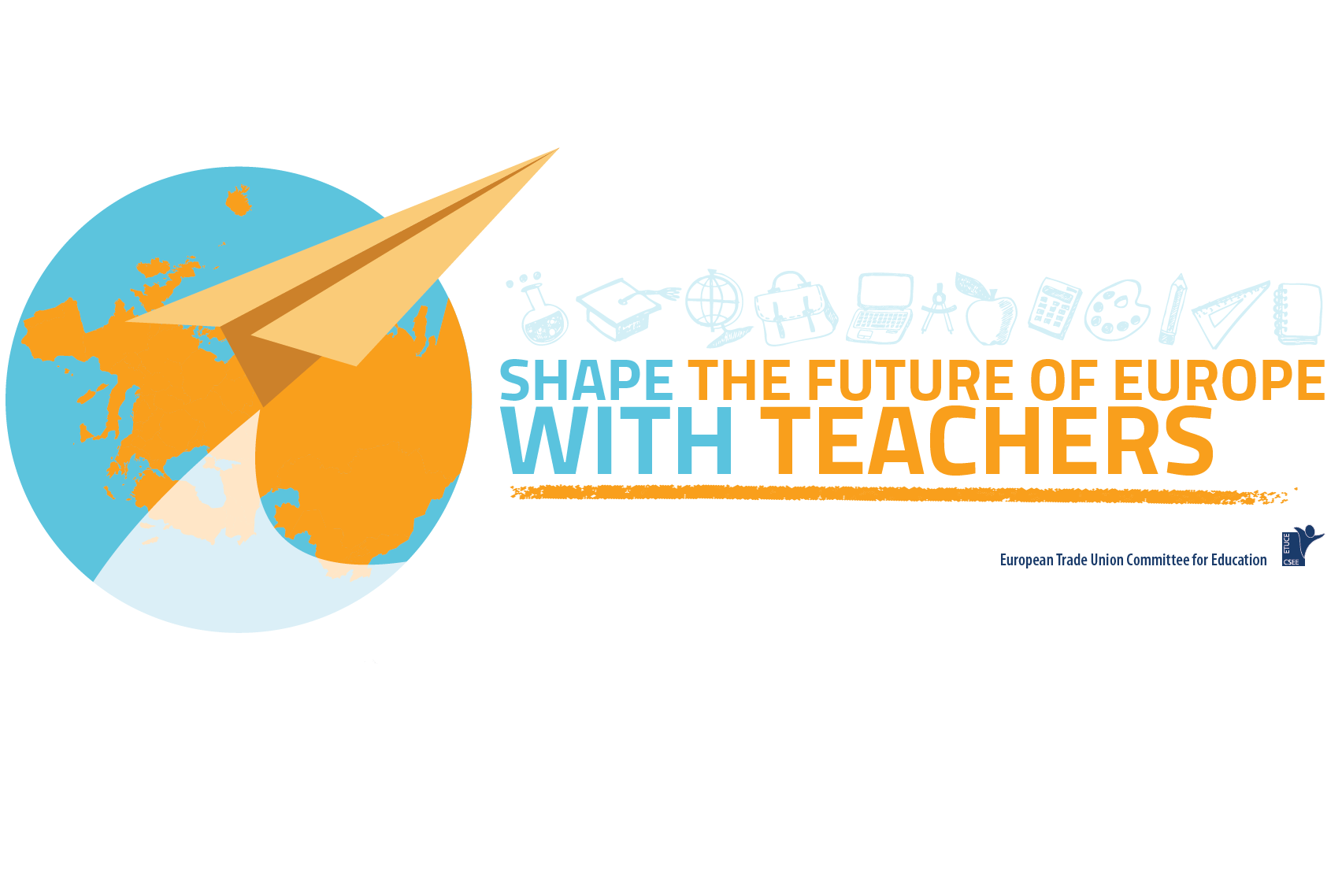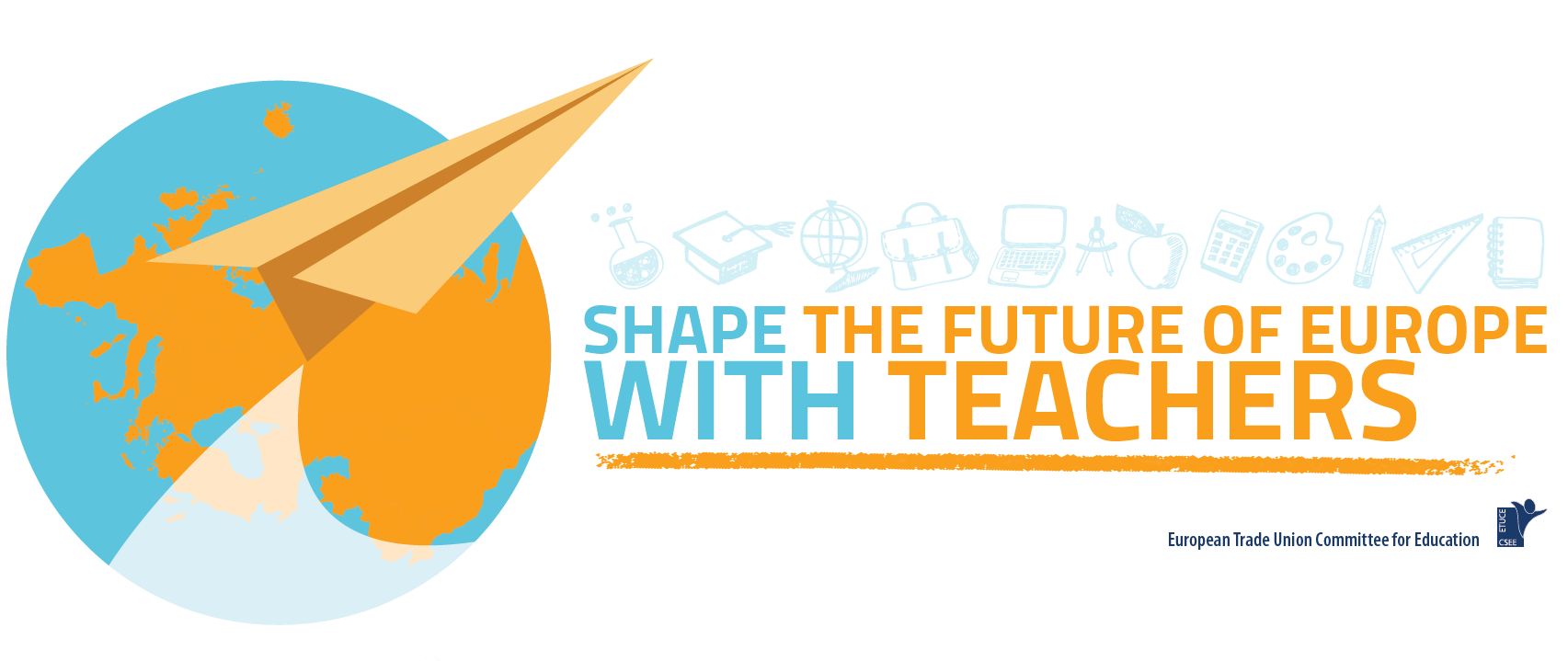Shape the Future of Europe with Teachers
Published:
An initiative from ETUCE and its member organisations to the European Parliament elections in May 2019 and a contribution to the EI Global Response.
Rationale
Privatisation and commercialisation trends, austerity measures, budget cuts and salary/pension/recruitment freezes in education, continue putting pressure on teachers, academics and their unions. At the same time, demands on education are rising to respond to the developments of modern society, such as digitalisation, inclusion and migration.
Across Europe the attractiveness of the profession is decreasing. Many countries are experiencing a shortage of teachers with less graduates entering the profession and experienced education personnel leaving the profession for various reasons, such as taking early retirement, employment in other sectors or another country for better working conditions.
To make the profession more attractive a focus on teachers’ needs is necessary, next to decent working conditions and work-life balance, there is an increased need for quality teacher training and support to teachers to reply to the needs of students and prepare them for lifelong learning in a changing world and to ensure access to quality education for all.
With growing nationalist and populist movements, and the tilt of politics in Europe to the far right, separatism and extremism are increasing in our society. More than ever, especially in these circumstances quality education and teachers have a crucial role to counteract this trend and are needed to help young people become creative, critically thinking democratic citizens who are conscious of their rights and obligations and the value of universal rights and democracy.
In light of the upcoming elections to the European Parliament and the EI Global Response, ETUCE and its member organisations contribute with a campaign, formulating clear demands to politicians, making the voice of teachers heard and raise awareness on the issues at stake.
With the heads of state of the EU member states having committed to establishing a European Education Area at the Gothenburg summit in 2017 and in light of the European Semester Process linked to the European Pillar of Social Rights, there is a momentum we can use to bring the value and status of the teaching profession to the attention of governments and education authorities at European and national level.
Aim
Quality education is a fundamental right and a public good. To bring about wide support in society for education and the teaching profession/joining forces around a new narrative on the teaching profession and the status of teachers. The campaign aims to provide counter arguments to the wide spread views that undermine the value of the profession and of publicly funded education. The campaign addresses the main challenges of our societies and specific challenges around teaching and learning.
The main challenges in our societies today, such as rising social fragmentation, discontent and social unrest are a fertile ground for populist, nationalist and racist movements. They are primarily based on differences around the role of private vs. public, individual vs. collective action, competition vs. solidarity. Specific challenges around teaching and learning follow from the low status of the public institutions in society that make schools ‘unattractive’ working (& learning) environments. Among these are: funding, low attractiveness of the profession/recruitment challenges, autonomy and ‘ownership’ of the profession – opportunities to define professional challenges and professional development needs, build work-place solidarity as opposed to ‘competitive’ models, impact of ICT, working conditions, equality and inclusion.
Following this approach, the campaign gives space for teachers, and society at large, including parents and students to speak out and be involved in the campaign concretely with their daily challenges and sharing their views.
Structure
The main actors of the campaign will be the ETUCE member organisations with their actions at national, regional and local level, e.g. organising meetings or awareness-raising events, interviews with experts, politicians and candidates for European/national parliament elections, creating print media, video messages or online activities adapted to the context of the union. The ETUCE campaign will be the umbrella/frame under which all the different actions can be collected.
The ETUCE Secretariat will establish a campaign platform where member organisations can share their actions and contributions, experiences and inspiration. This campaign platform provides the space for member organisations to dedicate their on-going and planned actions to the campaign.
Joint activities with other on-going actions, for example at national level with confederations, at European level with ETUC or other European Trade Union Federations, is a possibility to be explored.
Actions
Following the discussion and approval in the ETUCE Committee of the four key demands for this campaign,
The ETUCE Secretariat facilitates the campaign by:
- Compiling an ETUCE set of key demands to education authorities, governments, politicians that member organisations can use as they esteem best for their work and/or distribute to politicians and candidates running for the European Parliament elections in 2019 together with their concrete demands at national level. Translation into the five official languages of ETUCE
- Collecting the latest findings regarding the value and status of the teaching profession from existing ETUCE studies in a manual for distribution
- Creating a campaign infographic, poster and banner, other visual material such as videos
- Creating a campaign blog/app from where the key demands and campaign material can be accessed and downloaded and member organisations can share their actions with colleagues
- Regular updates via the ETUCE/EI websites
- Invite candidates for EP election to a hearing/ for interviews with member organisations.
ETUCE Member organisations contribute to the campaign by for example:
- Using and disseminating the ETUCE campaign material in union activities at national, regional and local level
- Developing campaign material, e.g. leaflets, posters for affiliates
- Organising events and actions to raise awareness on the importance of the teaching profession and the status of teachers for quality education
- Creating networks and cooperate with other education stakeholders
- Regularly reporting on campaign developments update on the union website
- Inviting candidates for European Parliament election/politicians to a hearing/ for interviews.
ETUCE’s key demands for the future of Europe
1 - Quality education for all

2 - Increased Public investment and attractiveness of the profession

3 - Strengthen social dialogue and involvement of education trade unions in decision-making

4 - Promoting democratic citizenship and inclusion

As European governments, in particular the member states of the European Union, have failed to build a coherent, unambiguous, unified, and single, rather than fragmented, migration policy, including the basic principle of solidarity, teachers are left to deal with the challenges without receiving the pedagogical, financial or administrative support and long-term assistance that they require. Hence, ETUCE demands sustainable funding and support for teachers and other education personnel in teaching democracy, human-rights, universal values and citizenship skills to competently address and cater for the needs of their students. In a fast changing world where innovation and digitalisation are major influencers of society, young people need to learn to become critical-thinking and responsible citizens who are aware of their rights and obligations and value mutual respect, equal opportunities and diversity.
